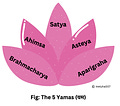Aparigraha, Consumerism and Ancient Indian Wisdom!
What is meant by Aparigraha and how you can practise it?
Alexander III of Macedon, commonly known as Alexander the Great, had conquered huge swathes of land and defeated many powerful kingdoms in his brief lifespan of 32 years. However, on his death bed, one of the last wishes he told his generals was that his hands should be let loose, hanging outside the coffin for all to see!
The message was to make people understand that we come to this world empty handed and we leave this world empty handed after the most precious treasure of all is exhausted, and that is TIME.
What does ‘Aparigraha’ mean?
‘Aparigraha’ (अपरिग्रह) literally translates to ‘non-possessiveness’. It is one of the five ‘Yamas’ (यम) of Patanjali's teachings. It is also a major vow that Jain monks undertake.
Is there something which you hold very tightly in life? Do you think you should still hold on to it or maybe you should let it go?
When we let go of what is no longer useful, we free up ourselves for new relationships, new ideas and a better way of living and being.
‘Aparigriha’ teaches us that we must possess ONLY what is NECESSARY.
When we try to assimilate more than we need or require; we get trapped in the vicious desire of coveting and greed which never lets us stay happy. In fact, it leads us to misery. It is a form of self-restraint that avoids an avaricious behaviour.
‘Aparigraha’ is also one of the main lessons in the “Bhagavad Gita”, which teaches non-attachment to the ‘fruits’ of our ‘actions’ and only directs us to focus on our efforts.
“Na vittena tarpaniyo manushyah”
(न वितेना तर्पणियो मनुश्यः)
Man can never attain peace with money
How to practise ‘Aparigraha’?
The tendency to run after worldly goods or to hoard material objects beyond one’s basic needs is born of a self-centric approach to life. It pollutes the mind and dwarfs the soul by stoking the subliminal inclination in a person to grab that which belongs to someone else.
This may generate:
conflict
tension
competition
violence in society
impediments in one’s spiritual growth.
Here’s how you can practise it:
Letting It Go. Possessions take up space and energy—Ex. Thoughts accumulate in in your head while materialistic things fill up your home. So try this: Every time you buy something new, let go of something old—give it away, or toss it out. By letting go of things from the past, you can live more fully in the present.
Breathe. When we get stressed out, we tend to hold our breath. This makes us even more anxious. Release the breath and allow it to flow fully and deeply. Then you will feel more relaxed, open, and spontaneous.
Practice Self-Care. When we are afraid and insecure, we may feel a need to cling on to OR control those who are closest to us. That rarely works. Instead, find ways to nurture and centre yourself so that you feel independent and strong in your own right, and can allow others to be who they need to be.
Be Positive. When we cling to negative thoughts, emotions, or memories, we spiral into destructive habit patterns. By replacing negative thoughts with positive ones, and by remembering your mantra, you create a harmonious space for yourself and others.
Forgive. Letting go of the painful memories from the past is extremely essential for your mental health. Free yourself by offering forgiveness to those who have hurt you and to yourself.
Practice. We often try to achieve perfection and in that pursuit, we miss the essence of practice. Do your best and then remember to release—physically, mentally, emotionally. Just as Bhagwad Gita teaches us to only associate ourselves with ‘ACTION’ and not with its ‘FRUITS’.
Being generous. Share your time, your energy, your knowledge, your attention, your connections with others. Donate, volunteer and give in whatever way you can.
‘Aparigraha’ is a virtue which has governed the spectrum of Indian idealistic thought for millennia. In this age of consumerism, practising ‘Aparigraha’ has become more important than ever. It needs to be imbibed by one and all to build up an egalitarian social order without state intervention.
“Big Billion Days”; “Great India Festival” and offers like these tempt the buyer inside us but it is very important to make any purchase only if there is an actual need for it.
Failure to do so will only clutter our homes and overburden our minds with unnecessary thoughts!
Thanks for reading! Hope you enjoyed 😊
Feel free to subscribe and receive ‘Your Daily Coffee’ daily in your box.






Very true. We are enlightened after reading such a nice and useful blog. Thanks 😊